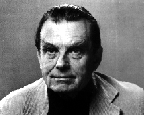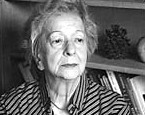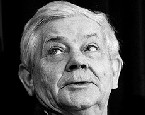    
|
Czeslaw
Milosz (b. 1911) is Poland's first poet to win the Nobel
Prize in literature (1980). Before him, the world's most prestigious
literary award was given to novelists Henryk Sienkiewicz (1905) and
Wladyslaw Reymont (1924). Milosz, already a recognized poet before
World War II and, initially, a diplomat for the Polish post-war
communist government, defected to the West in 1951. The Royal Swedish
Academy honored him as a poet "who with uncompromising
clear-sightedness voices man's exposed condition in a world of severe
conflicts." A long-term inhabitant of Berkeley, he now shares his
year between California and the much more historic Kraków, Poland.
His poem Bypassing Rue Descartes could be seen as yet
another reaction to Paris and the imposing wealth of its traditions
and culture; Miłosz, however, presents this all-too-frequent theme
with a recognizably Eastern-European tinge.
|
 |
| Wislawa
Szymborska (b. 1923) was too young to make her debut before the
war. After an early short socialist-realist episode, she gradually
worked her way into the Pantheon of modern Polish poetry. As a result,
her Nobel Prize in 1996, awarded for "poetry that with ironic
precision allows the historical and biological context to come to
light in fragments of human reality" came as a surprise only to
the nominee. Szymborska's Kraków address makes that city a true
capital of poetry.
Funeral is a good example of her the casual,
conversational tone of many of her works.
|
 |
| Zbigniew
Herbert (1924 -1998), freedom fighter in the Polish Resistance
during World War II, never dabbled in collaboration. His
intransigence made him a non-person at times; of the great trio of
Polish poets, he also by far the most philosophical and intellectual.
His poetry, including the famous Cogito cycle, was certainly
worth another Nobel Prize. It is, sadly, too late for that now:
Herbert died recently, after a long and debilitating disease, in a
Warsaw hospital.
In Elegy of Fortinbras, Herbert appropriates and
reinterprets Hamlet, that most Polish of Shakespeare's plays.
Hamlet the intellectual is dead; he is replaced by Fortinbras,
"the strong-arm-man."
|
 |
| Krzysztof
Koehler (b. 1963) is one of the new generation of poets who came
of age at the very end, or already after the collapse, of communist
rule. These 'New Barbarians,' as they like to call themselves, believe
in the need to find a new idiom that would eschew the Polish
(post-)Romantic tradition, and have been especially outspoken in
influential quarterlies BruLion [Sketchbook] and NaGlos
[Aloud]. Koehler's connection with this course is of a particular
nature: he taught it twice at Rice, in 1997 and 2000.
His Kraków is perhaps one of the best modern poems on
Poland's most magical city.
|
 |
| Marcin
Świetlicki (b. 1961) is another New Barbarian, perhaps the most
barbaric of them all. He certainly drives that point home by leading
his own rock band, Świetliki (Polish for glow-worms, but of
course the joke is on a possible English pronunciation of his name).
As a result, he is popular with two separate audiences: the
intellectual and the teenager, for two different aspects of his
activity.
The Work Ethic is a good example of his ironic style. McDonald's,
on the other hand, is an instance of Świetlicki's music.
|
 |
|
![]()